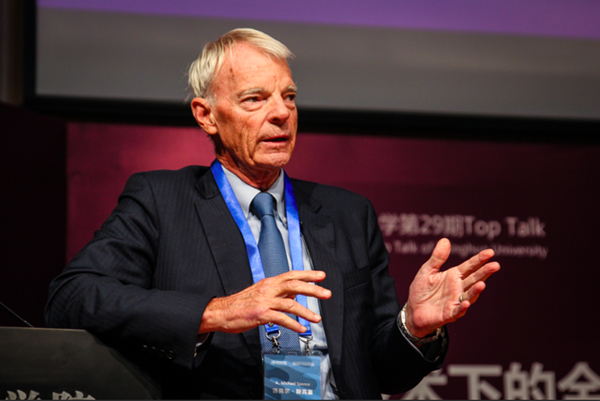
Digital technologies are close to overtaking labor-based technologies, a Nobel Prize-winning economist told Tsinghua University students on Oct. 17. And when they do, there is no turning back.
“When digital technologies pass some other process that we use, they permanently beat it. It’s gone. There’s no return from that,” 2001 Nobel Prize winner A. Michael Spence said in a speech. “The digital technologies under the heading ‘automation’ are either at or very close to the point of displacing the labor-intensive assembly.”
Spence believes this will leave developing countries without specialized products in the lurch as their economies will continue to consist largely of local products such as food, clothing, and housing. For economic success, “you have to sell something to the global economy,” he said.
Spence, a Stanford University professor, shared the Nobel Prize for economics in 2001 with George A. Akerlof and Joseph E. Stiglitz.
Spence said that after the Second World War, most countries used low-cost labor scattered across the globe to serve big economies. But technology, he argued, will fundamentally change that because it is cheap to move money, data, goods and services around the world.
“One of the reasons China is powerful is because it has a rapidly growing market. It used to be true for those earlier stage economies that access to the advanced country market was critical. It’s not critical now.”
Spence believes tech behemoths such as Baidu, Alibaba, Google, Amazon and are developing cutting-edge technology shows how the power is shifting.
“Our economies are starting to be built on digital platforms, and I mean the whole economy, not just some sector,” Spence said.“It’s because that’s where the mega platforms because they need a lot of digital data and computing power.”
Spence believes the uncertainty caused by the ongoing U.S.-China trade war is hampering global economic growth, because world economies are interlinked.
“We have a period of heightened uncertainty over where the world is going,” Spence said. “If we get lucky, and the negotiators come to some agreement, you’ll see things that will make this partly go away.” Spence said.
The IMF cut its latest global economic growth forecast on Tuesday from 3.2% to 3%, the slowest since the 2008-2009 financial crisis.Spence said income inequality is widening across the world and if overlooked it adds to political and social polarization.
“That political and social fragmentation, the rejection of elites, political parties, etcetera, produces all kinds of problems of governance which then leads back to making it more difficult to deal with these issues,” he concluded.
(By NICO GOUS)

